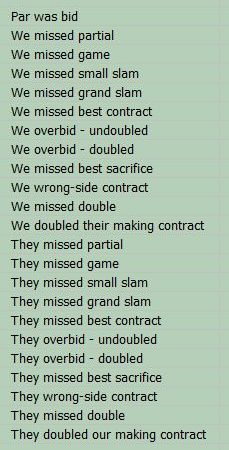Bridge players are aware of Double Dummy (DD) analysis on the play of the hand and also the concept of the "Par Result". The key point is that DD analysis, unlike "real" bridge, makes its calculations after looking at all 52 cards. It knows how to drop a singleton king offside, how to engineer the perfect end play or squeeze, and just when to finesse. Despite the many flaws of DD bridge, many feel that it can provide valuable insight into improving one's game.
|
Double Dummy Solver has taken this concept one step further by introducing the concept of "DD Bidding". Based on DD analysis, did we overbid, miss a sacrifice, or perhaps wrong-side a contract; i.e. declare from the wrong side of the table. Based upon the final contract and a DD analysis, DDS classifies the bidding on every deal into 23 different categories.
Here are the guiding principles used:
Rules on which side has erred on a hand:
If the defending side can make a bid that results in a better score for them than the final contract they have made an error. If the declaring side can make a bid that results in a better score for them than the final contract they have made an error. When there's a higher contract with the same score as the final contract, the defense should bid higher if it's safe. 3. Passed out hands-The side with the highest making contract has made the error. |
Rules on what to call error when more than one category appears to apply:
| 1. | Doubling a making contract is generally the worst error. |
| 2. | Missed bid vs Overbid – missed bid applies when the contract makes but it's not the best contract. Overbid means the final contract goes down with a worse score than the other side's best score. |
| 3. | Wrong-sided – when played from the other side the contract should yield the best possible score. It might be a sacrifice. |
| 4. | Overbid – overbid means that the score for the final and higher contracts is worse than par. It applies only when final contract goes down. |
| 5. | A sacrifice - any contract that goes down and produces a result that is par or better. It may or may not prevent the opponents from achieving their best score. It must meet these three criteria: |
It is a failing contract
It must improve the score from the final contract, based upon double dummy defense.
No matter what the opponents bid over our call, our result must still be better than the final contract's double dummy score.
| 6. | Missed best contract versus missed best partial/game/slam – missed best contract means the difference in score was less than 90 points, but at least the bid is in the same category as the best bid. Missed best contract means you bid the wrong partial, game or slam. Missed partial/game/slam occurs when the final contract is a making but is not the same category as the best bid. |
| 7. | Missed partial/game/slam vs Wrong-side contract - when both apply the characterization is wrong side contract. |
| • | An example of missed best contract: You bid and make 3NT (+400) while 4S also makes (+420). |
| • | An example of missed game: You bid and make 4C when 3NT is also makeable. |
